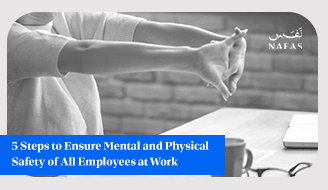5 Steps to Ensure Mental and Physical Safety of All Employees at Work

Ensuring the mental and physical safety of employees at work is a key way to streamline workflow, due to their importance for both work and employees.
A physically and psychologically safe work environment can dramatically boost employee productivity and workflow.
Understanding the pressure and stress factors that arise in workplaces and providing the best support and resources to deal with these factors are considered essential parts of effective human resources strategies.
Therefore, in this article, we will review crucial points that should be considered if you want to enhance your employees’ safety and improve the work environment.
Steps to Ensure Employees’ Mental and Physical Safety at Work
Ensuring employees’ mental and physical safety at work is not just a preventive measure to avoid injury and illness. It is a broad measure based on many foundations and strategies to achieve the desired goals.
High employee morale means a successful establishment in every means. Therefore, you should follow these 5 steps to ensure employees’ mental and physical safety at work:
1. Ensure a Healthy Work Environment (ventilation, heating, breaks, etc.)
There are beliefs that a healthy work environment is merely about complying with physical health and safety standards while ignoring the moral and essential aspects, such as providing all means of physical protection from harm like fire extinguishers and exit doors. Despite the importance of this, there are other concerns and complementary elements that must be provided, such as:
Allow employees to have sufficient breaks during working hours to regain their energy and recharge, to enable them to return to work at their full capacity. Also, providing a dedicated break area offers real ease for employees and is a key factor in ensuring psychological safety at work.
Experts recommend allocating at least one hour for breaks; however, some companies still only allow 15 minutes, which is far from sufficient.
Provide proper ventilation and heating systems to maintain their comfort and avoid issues related to extreme temperatures.
Additionally, paying attention to the infrastructure is crucial due to its significant influence on the mental well-being of employees, encompassing the color of the walls, the design of chairs and desks, and adherence to good hygiene in both offices and restrooms.
2. Promote Work-Life Balance
The pursuit of excellence, high expectations, and rapid changes in today’s work life place significant pressure on employees, and can negatively impact their well-being. Therefore, duties and tasks should be distributed fairly and equitably to enable employees to achieve a healthy work-life balance.
Studies show that a moderate level of work pressure is a common experience for employees, but excessive and exaggerated pressure will profoundly diminish their mental state and lower morale.
Effective managers understand that the mentioned factors can negatively impact work productivity, making it difficult for employees to complete their assigned tasks on time, and making them more prone to absenteeism or tardiness.
Consequently, organizations should proactively adopt management strategies that help distribute tasks effectively, streamline workflow, meet deadlines, reduce pressure levels, and avoid employee burnout.
3. Support Mental Well-being
Supporting mental well-being is one of the key factors and steps toward ensuring the physical and psychological safety of the employees, as it allows them to feel comfortable at work and enables them to handle any stress or challenges that arise, leading to peak productivity!
Many companies have noticed that prioritizing mental well-being in the work environment positively impacts all aspects of work. This includes increased productivity and creativity among employees, as well as they become more committed to doing their assigned tasks than before, and all of these positive changes are thanks to successful stress management strategies.
4. Encourage the Effective Communication Between Employees
Studies have proven that inadequate communication among coworkers, or with their managers and supervisors, can negatively affect their mental well-being. This can lead to job dissatisfaction and psychological pressures, which may result in higher absenteeism rates. It may also be the primary reason for breakdowns and lack of trust among all parties involved in the workplace. Therefore, enhancing effective communication skills between employees and management is extremely important. However, it requires considering the following:
- Pay attention to testing communication skills for new employees, and focus on developing them for the existing ones.
- Address and outline the scope of discussions when opinions differ, with the idea that differing opinions do not spoil the friendship.
- Set clear boundaries and rules that govern interpersonal interactions among employees, and impose penalties for those who violate, threaten, or overstep others’ boundaries.
- Promote diversity and inclusion in the workplace to prevent the formation of cliques that can negatively impact the workplace.
5. Empower Your Employee’s Growth and Development with Labayh Business
Companies and organizations are responsible for supporting employees’ training and personal growth to ensure their mental and physical safety at work. This requires collaboration with specialized and proficient business psychology consulting agencies, and this is what we offer at Labayh Business, where you can find numerous workshops, tools, and awareness campaigns to help you achieve the highest levels of mental comfort for your team.
Our professional trainers make tremendous efforts to help employees overcome the challenges at work and beyond, whether in mental well-being, personal growth track, social counseling, and more.
















